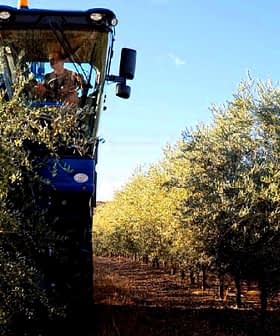Spanish Table Olive Producers Demand Countermeasures Against U.S. Tariffs
The Interprofessional Organization of the Table Olive Sector asked the Spanish government and the European Union to investigate U.S. government subsidies that have recently been provided to American farmers.
 Spanish green olive exports to the U.S. now face a 25 percent tariff
Spanish green olive exports to the U.S. now face a 25 percent tariffAs American tariffs are imposed on Spanish green olive imports, an umbrella group of table olive producers has sent the Spanish government a list of demands.
Chief among them is a request that the government asks the European Union to begin investigating whether the United States unfairly subsidizes its farmers.
Dialogue is not incompatible with the adoption of pressure measures as the U.S. normally does.
“The European Union must immediately open an investigation into the aid that the United States gives to its farmers as the basis for a request for the imposition of counter tariffs in front of the World Trade Organization (WTO),” the Interprofessional Organization of the Table Olive Sector (Interaceituna, as it is abbreviated in Spanish) wrote in their letter.
In the past two years, U.S. President Donald Trump has approved two aid packages with a combined value of $28 billion for American farmers, which is meant to to compensate them for revenue lost in a separate trade dispute with China.
See Also:Table Olive News“We hear very often that the U.S. also grants aid to its farmers,” Antonio de Mora, the secretary-general of Asemesa, one of the groups represented by the Interaceituna, told Olive Oil Times. “If it turns out that it is true that there are subsidies that do not comply with the rules of the WTO, these must be placed on the negotiating table. In short, we must act with the same firmness as the United States.”
De Mora added that every effort must be made by both the E.U. and Spanish government to negotiate with the U.S. in order to mitigate the damaging impacts of the tariffs on table olive producers.
With a 25 percent tariff on four different types of Spanish green olive exports that took effect last week and a 27 percent tariff on black olive exports to the U.S. that has been in place since August 2018, many producers are feeling the financial pressure.
According to Interaceituna, almost all Spanish table olive exports to the U.S. have been impacted by one of these two tariffs. The U.S. is the largest single market for Spanish table olives, with more than one-fifth of the country’s total exports destined for American ports.
So far, farmers have been unsuccessful in replacing lost revenue from the U.S. market with new export destinations, which makes resolving the current trade conflict paramount in the eyes of de Mora.
“The U.S. has imposed tariffs but has repeatedly stated that it is open to finding a solution,” de Mora said. “Therefore, the E.U. must sit down immediately to talk without waiting for the WTO decision on the Boeing issue.”
According to Cecilia Malmström, the outgoing European Trade Commissioner, the WTO will soon rule in favor of the E.U. on its own complaint into illegal American subsidies for aircraft manufacturer, Boeing.
Malmström emphasized that the E.U. wanted to avoid an escalating trade war, but was prepared to hit various U.S. agricultural products with tariffs of its own upon receiving the WTO ruling.
The E.U. has also filed a complaint with the WTO regarding the 27 percent tariff that was unilaterally placed on Spanish black olive exports as a result of an anti-subsidy investigation by the U.S. International Trade Commission.
“Dialogue is not incompatible with the adoption of pressure measures as the U.S. normally does,” de Mora said.
De Mora, along with representatives from the four other agricultural groups that make up Interaceituna, concluded their letter urging the Spanish government to act with the same kind of resolution as the U.S. government did in applying the tariffs. In the letter, the officials argued that a lot more is at stake than simply lost revenue.
“Much more is at stake than the total value of exports of table olives from Spain to the U.S. ($201 million),” Interaceituna wrote. “The work and investments of many years are at stake, [as is] the position gained in the market and the great expectations of the future.”








